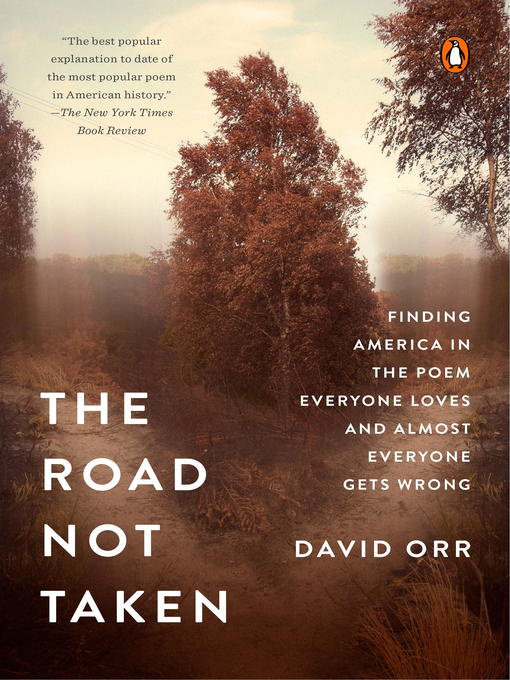
The Road Not Taken
Finding America in the Poem Everyone Loves and Almost Everyone Gets Wrong
- اطلاعات
- نقد و بررسی
- دیدگاه کاربران
نقد و بررسی

April 20, 2015
New York Times poetry critic Orr, in his engaging follow-up to Beautiful and Pointless: A Guide to American Poetry, narrows his scope to focus on one of America’s most beloved and most misunderstood poems. Even with poetry‘s diminished hold on the popular consciousness, many Americans can still recite the final lines of Robert Frost’s “The Road Not Taken” from memory (though most would probably misidentify it as “The Road Less Traveled”). Orr looks at how one poem could become so well-known among a generally poetry-allergic populace that it’s been used to launch a self-help revolution, provide titles for episodes of TV shows, and, further afield, sell cars in New Zealand. The book is divided into four sections, beginning with “The Poet,” a biographical sketch of Robert Frost the man and “Robert Frost” the myth. “The Poem” offers a close reading that disputes both popular readings of the poem as “a paean to triumphant self-assertion” and more critically accepted interpretations of it as a “joke (or trick).” “The Choice” probes American conceptions of choice from the days of the Founding Fathers to contemporary neuroscience. Finally, “The Chooser” synthesizes previously presented ideas into a nuanced discussion of modern selfhood. Orr blends theory, biography, psychology, science, and a healthy dose of pop culture into a frothy mix so fun, readers may forget they’re learning something. Betsy Lerner, Dunlow, Carlson & Lerner.

May 1, 2015
Unraveling the mystery of a famous poem. New York Times Book Review poetry columnist Orr (Beautiful and Pointless: A Guide to Modern Poetry, 2011) brings his finely honed skills as a literary critic to a meticulous investigation of Robert Frost's beloved poem, "The Road Not Taken," which Orr believes has been consistently misread. The poem, he argues, is not "a salute to can-do individualism" or an exhortation to choose an uncommon path in life. Orr presents a fresh, perceptive reading of the verse; places it in the context of Frost's life, other works, and public persona; and considers the meaning of choice in American culture. Anyone writing about Frost confronts an early biographer's portrayal of him as a monster: unfeeling, arrogant, and cruel. "Frost is always being rescued, always being reclaimed," Orr notes. "He's like a disputed frontier, constantly contested, and this book is yet another stone thrown in that conflict." Orr sees Frost as neither monster nor angel, nor the modest, "witty, rural sage" that became his public image. "The Road" was inspired by Frost's dear friend Edward Thomas, who tried Frost's patience with his "romantic sensibility," indecisiveness, and "self-dramatizing regret." Frost meant the poem as a joke, but Thomas-and future generations of readers-failed to understand the humor. Instead, many readers took the poem as underscoring Americans' "belief in human perfectibility, a concept that assumes the humans in question can make choices that will lead to improvement." As the poem seems to imply, taking one road rather than another can make "all the difference." Orr, though, concludes that the poem is a "critique" of the choosing self. "What matters most, the poem suggests, is the dilemma of the crossroads," a troubling, unsettling intersection; a space, Orr suggests, "for performance and metaphor." An illuminating voyage into the heart of Frost's poem and the American spirit.
COPYRIGHT(2015) Kirkus Reviews, ALL RIGHTS RESERVED.

May 15, 2015
Orr, poetry columnist for the New York Times Book Review, provides a literary and cultural examination of human desires and the United States through this book-length study of Robert Frost's famous 1915 poem "The Road Not Taken." Orr finds that Frost's poem, which is an exploration of choice symbolized by reaching a crossroads, is more complicated than it appears and the overall meaning of it may be quite different from what most admirers and readers of the poem believe. Although the poem is revered worldwide and is arguably a universal creation, Orr sees it as decidedly American, owing to its central theme of free choice and self-determination. In his examination, the author first writes on Frost's life and then discusses the origins of the verse. The final chapters provide a critique of the poem, often through a cultural lens. VERDICT This entertaining book, published on the centennial of Frost's poem, will appeal to poetry and American literature lovers, as well as to readers interested in the interweaving of art and culture. [See Prepub Alert, 2/9/15.]--Stacy Russo, Santa Ana Coll. Lib., CA
Copyright 2015 Library Journal, LLC Used with permission.

March 1, 2015
Most Americans will immediately recognize that Orr's title is taken from Robert Frost's much-loved, much-quoted classic. And so will many foreigners; as Orr says of a New Zealand advertisement that uses the poem without citation: "For any mass audience to recognize any poem is (to put it mildly) unusual. For an audience of car buyers in New Zealand to recognize a hundred-year-old poem from a country eight thousand miles away is something else entirely." Poetry columnist for the New York Times Book Review, Orr here argues (no doubt with his typical calm incisiveness) that Frost's poem effectively sums up slippery, many-cornered America. And here's the fun part: he also argues that the poem is essentially misunderstood.
Copyright 2015 Library Journal, LLC Used with permission.




دیدگاه کاربران